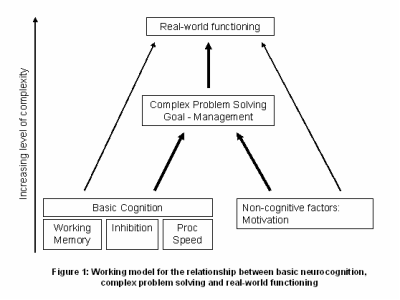Project Description
Complex problem solving as a mediator between basic cognition and real-world functioning
 The core theme of the present research project is the
relationship between basic cognitive processes, performance on complex
cognitive tasks and real-world functioning. Basic cognitive processes
examined in the laboratory are often not easy to relate to real-life
situations, both in investigations of healthy individuals and in the
clinical context. Research on complex problem solving was originally
started to address precisely this gap between “the narrow
straits of the laboratory and the deep blue sea of field
research” (Funke 2001). In the proposed research, we will use
the construct ‘complex problem solving’ as a
mediator between basic cognition and real-world functioning, and use a
multi-disciplinary approach to characterize the interrelation between
these three levels of analysis. To this end, tightly coordinated
studies using computational modelling, neuropsychological testing,
functional neuroimaging, as well as pharmacological and behavioral
interventions will be conducted in the context of narrowly defined,
shared behavioral paradigms.
The core theme of the present research project is the
relationship between basic cognitive processes, performance on complex
cognitive tasks and real-world functioning. Basic cognitive processes
examined in the laboratory are often not easy to relate to real-life
situations, both in investigations of healthy individuals and in the
clinical context. Research on complex problem solving was originally
started to address precisely this gap between “the narrow
straits of the laboratory and the deep blue sea of field
research” (Funke 2001). In the proposed research, we will use
the construct ‘complex problem solving’ as a
mediator between basic cognition and real-world functioning, and use a
multi-disciplinary approach to characterize the interrelation between
these three levels of analysis. To this end, tightly coordinated
studies using computational modelling, neuropsychological testing,
functional neuroimaging, as well as pharmacological and behavioral
interventions will be conducted in the context of narrowly defined,
shared behavioral paradigms.
Complex problems can be characterised by a range of features such as their large number and high connectivity of problem variables, autonomous change of these variables over time and intransparency of the problem situation (Funke 2003). These features are similar to the demands of our everyday life, and therefore make the construct ‘complex problem solving’ a suitable predictor of functional capacity in everyday life. The feature most pertinent for the proposed research is polytely, the presence of multiple, possibly contradictory, goals and subgoals (Doerner 1989). Polytely imposes a cognitive demand to select and prioritise goals and to resolve goal conflicts, and implies the existence of cognitive processes that handle these demands (henceforth subsumed under the term ‘goal management‘). Goal management is a central feature of successful planning and problem-solving (Doerner et al 1983). For these reasons, the present project will focus on goal management processes and how they relate to basic cognition and real-life functional outcome.
Most cognitive neuroscientific research relevant to the present topic has been subsumed under the term executive function, a concept that has been used to address multiple levels of cognitive processes (Burgess et al 2006; Kaiser et al 2005). However, since the relations between different levels of cognitive processes are the very goal of the present research proposal, we will use the terms complex problem solving / goal management and basic cognition in order to explicitly address the level of the cognitive process under investigation.
^ TOP^ TO TOP